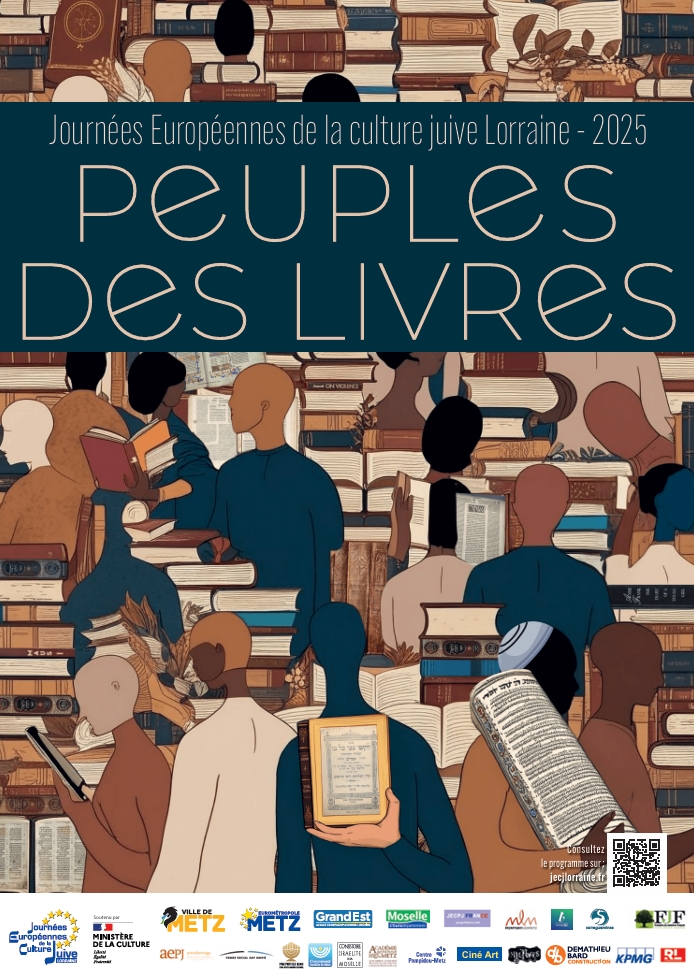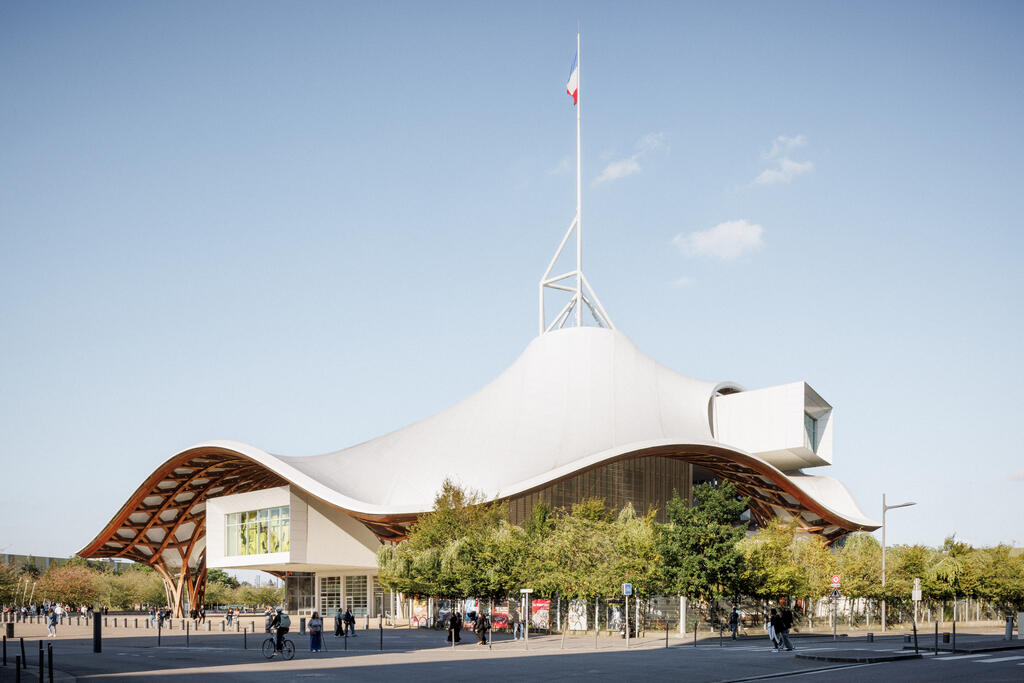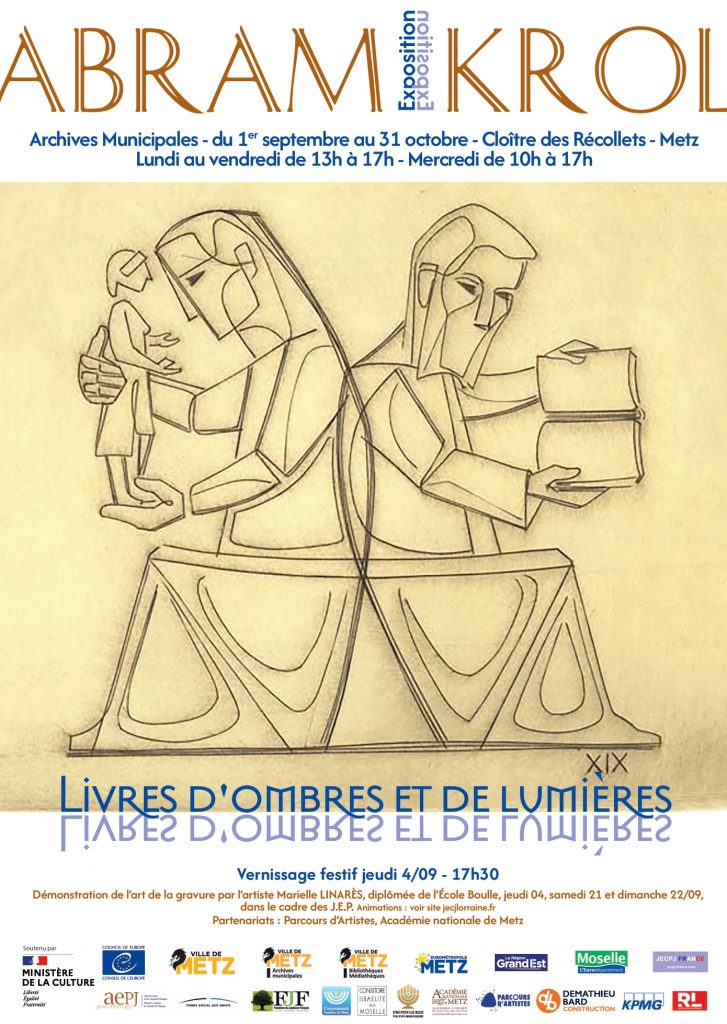The European Days of Jewish Culture offer a rich and varied programme in Lorraine, thanks in particular to the number of partnerships with cultural and municipal institutions in the region, as Désirée Mayer, President of the EDJC Lorraine, explains.

Jguideeurope: What event will open the EDJC Lorraine?
Désirée Mayer: In a world where voices are too often raised in discord and violence, Jewish culture tirelessly reminds us of the unifying power of the written word. This year, the European Days of Jewish Culture – Lorraine are celebrating the evocative theme: ‘Peoples of the Books’. Throughout the centuries, books have been the vehicle of living memory, a bridge between generations and a bulwark against oblivion.
To mark the resolutely festive nature of the launch, we have chosen to combine it with the celebration of the 15th anniversary of the Centre Pompidou-Metz. It is therefore in this flagship venue for art and culture in our country that we will invite the public on Sunday 7 September for a EDJC Day of cultural discovery through art and conviviality.
In the presence of partner institutions and associations, the public will be able to take part in a live radio programme (RCF-Radio Jerico), learn about art engraving (Association Parcours d’artistes), Ukrainian art (Association Echanges Lorraine-Ukraine), and Hebrew calligraphy (with artist Michel D’Anastasio).. They will be able to see works from the Hébraïca collection (from the Metz Media Libraries) up close, enjoy performances by musicians, actors and opera singers (Ecole de Musique Intercommunale, Compagnie Théâtre à dire, Cercle Lyrique), take a guided tour of the two amazing exhibitions currently on display at the Centre Pompidou, or opt for a film (CinéArt and Marlymages associations) while sampling some Jewish specialities.
In an adjacent room, visitors can watch a screening of the film The Dibbuk, made in 1937 by Michał Waszyński, based on the famous play by S. An-ski. This masterpiece of Yiddish cinema will be presented by Serge Bromberg, French film presenter, director, producer and restorer, who is passionate about archive cinema and rare films and supervised the remastering of Le Dibbouk.
A drinks reception will bring this event to a close. Thanks to various partnerships, the EDJC-Lorraine will once again be able to offer a rich and varied programme over a four-month period.
(PARTNERS: Centre Pompidou-Metz, – Metz Media Libraries –RCF-Jerico – Parcours d’Artistes, CinéArt – A.N.M. – ELU – EMARI – Marlymages…)

What other events are planned?
With the launch, our 2025 programme covers eighteen areas (a blessed number!). Each of these themes has been developed with different partners in order to encourage a real diversity of audiences. Each theme includes several events.
Thus, even before the launch, from 1 September to 31 October, we will present the exhibition Abram Krol – Books of Shadows and Light at the Municipal Archives, Cloître des Récollets, Metz.
A silencer of silence and poet of matter, Abram Krol transforms copper into pages and his chisel into writing. His books are worlds where words become traces and images become meditation. The exhibition invites visitors to enter the incandescent margins of an infinite dialogue between books and life. The festive opening will take place on Thursday 4 September at 5.30pm. Several events are planned around the exhibition:
• Demonstration of the art of engraving by artist Marielle Linarès, a graduate of the École Boulle during the opening, then as part of the JEP on 21 and 22 September.
• Lecture by A.P. Syren (venue, date and times on jecjlorraine.fr)
• Off-site university course (venue, date and times on jecjlorraine.fr)
(PARTNERS: Municipal Archives, Parcours d’Artistes, Metz National Academy, University of Lorraine, etc.)
On Sunday 5 October, from 2pm, we will be offering our fellow citizens an original interactive symposium entitled The Academicians and their books, which will take place in the Grands Salons of the Hôtel de Ville in Metz.
PARTNERS: City of Metz – Metz National Academy – EMARI – Intercommunal Music School
Three EDJC events, a play and two meetings, will take place in the Metz Libraries and Media Libraries, in partnership with this institution (dates and times on jecjlorraine.fr)
PARTNERS: Metz Libraries and Media Libraries
A film festival: “EDJC Tuesdays” will take place from mid-October to mid-December at the Marlymages cinema in Marly. The films will be presented by passionate specialists.
PARTNERS: Marlymages and CinéArt associations
Each of the major bookshops in Metz will partner with one of our ‘Meet the Authors’ events, based on literary releases in 2024/2025 (venues, dates and times on the jecjlorraine.fr).
In partnership with the ‘Livre à Metz’ book festival, the EDJC will be offering a ‘Books at School’ initiative.
On Sunday 2 November, to mark the reopening of the large consistorial synagogue after renovation work, the EDJC is hosting an open day with guided tours of the synagogue, conferences and, as a grand finale, a fantastic concert by the Balagan orchestra, featuring virtuoso violinist Stéphane Rougier.
PARTNERS: City of Metz – Jewish Consistory of Moselle – Jewish Community of Metz
On Thursday 13 November at 8pm in the Europa Schuman hall in Montigny lès Metz, the Swing Street Quartet and the EDJC-Lorraine will get their friends swinging and jazzing with The Real Book Project. A mischievous nod to the ‘Good Book’, as the Bible is known in the United States, the Real Book is a collection of jazz standards compiled by students at Berklee College of Music in the 1970s, which quickly became the bible for jazz musicians around the world.
PARTNERSHIP: Town of Montigny-lès-Metz
At the Metz University Library, Ile du Saulcy, from 17 November to 20 December, you can see the exhibition “Resistance through Art and Culture” (opening, dates and times on the website jecjlorraine.fr).
PARTNERSHIPS: University of Lorraine – Metz University Library
On Saturday 22 November at 8pm, Noémie Waysfeld sings Barbara, accompanied by the Metz National Orchestra, Grand Est, conducted by Déborah Waldmann, in the Salle de l’Arsenal, Cité Musicale, Metz.
Between timeless classics and rarer tracks, a whole heritage of emotions, confessions and silences is brought back to life by the grace of Noémie Waysfeld. The Metz National Orchestra provides a setting worthy of her infinitely nuanced voice, which knows how to slip into every crack.
PARTNERS: Cité Musicale – Metz
Franz Kafka at the Cinema – Cinéma le Klub, Metz (dates and times on jecjlorraine.fr)
Film screenings: The Trial – Orson Wells; The Castle – Michael Heinekke, Kafka – Steven Soderbergh, Letters to Milena – Robert Bober
In the presence of Léa Weinstein, author of the book In Search of Franz Kafka
PARTNERSHIP: CinéArt, Librairie Autour du Monde
As every year, the EDJC-Lorraine will present a play in secondary schools in Metz.
In partnership with local towns and Jewish communities, EDJC-Lorraine will coordinate cultural and artistic events in Lorraine (venues, dates and times on jecjlorraine.fr).

Have you noticed a change in interest in these events over the past two years?
Things have changed a lot in the last two years. This is less evident in terms of attendance than in the atmosphere. Previously, it was purely about enjoying cultural exchange. The majority of the audience was non-Jewish, coming to discover something new, and the Jewish audience came to recharge their batteries; both seemed keen to get to know each other better and exchange ideas. The day after 7 October, tensions became palpable. Attendance at the events did not decline, nor did public interest. But the stakes were no longer quite the same: something resembling a commitment was emerging. The Jewish public found a way to assert its presence in the city, and many non-Jews came to show their sympathy and friendship.
As the association works extensively with partners and therefore with a diverse audience, there were times when, during debates, for example in the presence of very militant organisations such as the MRAP, divisions were strongly marked. Nevertheless, freedom of speech has always been preserved and duly respected. The tragic nature of history has transformed what was once a pleasure into a commitment, even a vocation.
Do you think that sharing Jewish cultural heritage can help combat the rise of anti-Semitic hatred in Europe?
Not only do I believe that cultural sharing helps combat the rise of anti-Semitic hatred in Europe, but I would even say that it is the first and perhaps the best means of doing so. Cultural and artistic programmes, in open and friendly settings, are a way of inviting our fellow citizens to the table of spiritual and, above all, existential nourishment. Accompanied by ‘real presences’, to quote Georges Steiner, by words and looks, these special moments spent together are vaccines against clichés and stereotypes. Well organised, these ‘Days’ can enlighten, dispel the darkness of ignorance and, through their contributions and generosity, become perfect weapons against anti-Semitic hatred. And against all hatred, for that must be their vocation.